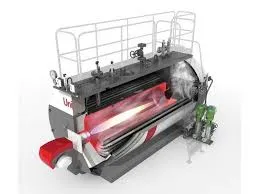
Nov . 01, 2024 04:25 Back to list
Understanding Steam Boiler Efficiency and Its Impact on Performance and Energy Savings
Understanding Steam Boiler Efficiency
Steam boilers play a crucial role in various industries, including power generation, manufacturing, and heating. The efficiency of a steam boiler is a key factor that impacts operating costs, energy consumption, and environmental sustainability. In this article, we will explore the concept of steam boiler efficiency, its determinants, and ways to enhance it.
Steam boiler efficiency is defined as the ratio of useful energy output to the energy input required to generate steam. It is often expressed as a percentage. A high efficiency means that more of the energy consumed is converted into steam, which in turn leads to reduced fuel costs and lower emissions. Conversely, low efficiency indicates that a significant amount of energy is wasted, which can negatively impact both the environment and the bottom line for companies.
Several factors influence the efficiency of a steam boiler. Firstly, the design and construction of the boiler itself play a significant role. Modern boilers are often designed with advanced combustion technology that optimizes the burning of fuel, leading to higher efficiency. Additionally, the material used in the boiler can affect heat retention and transfer, impacting overall performance.
steam boiler efficiency

Operational practices are another critical determinant of steam boiler efficiency. Regular maintenance, including cleaning and inspections, helps ensure that the boiler operates at peak performance. Over time, soot and other deposits can accumulate, which may hinder heat transfer and result in energy loss. Operators must also monitor water quality, as impurities can lead to scaling or corrosion, further decreasing efficiency.
Another important aspect to consider is the type of fuel used. Different fuels have varying energy contents and combustion characteristics. Utilizing high-quality fuels can improve efficiency, while using lower-grade fuels may result in incomplete combustion and increased emissions. Furthermore, the implementation of technologies such as flue gas recirculation and heat recovery systems can significantly enhance the efficiency of steam boilers. By capturing waste heat and reusing it, these technologies help mitigate energy losses.
In conclusion, steam boiler efficiency is a vital metric that can greatly affect operational efficiency and environmental impact. By understanding the factors that influence efficiency and adopting best practices, industries can optimize boiler performance, reduce costs, and contribute to a more sustainable future. Regular maintenance, quality fuel selection, and advanced technologies are essential components in achieving high steam boiler efficiency, ensuring that these systems function effectively in meeting the demands of various applications.
-
High-Efficiency Commercial Oil Fired Steam Boiler for Industry
NewsJul.30,2025
-
High-Efficiency Biomass Fired Thermal Oil Boiler Solutions
NewsJul.30,2025
-
High Efficiency Gas Fired Thermal Oil Boiler for Industrial Heating
NewsJul.29,2025
-
High-Efficiency Gas Fired Hot Water Boiler for Sale – Reliable & Affordable
NewsJul.29,2025
-
High Efficiency Biomass Fired Hot Water Boiler for Industrial and Commercial Use
NewsJul.29,2025
-
High-Efficiency Biomass Fired Hot Water Boiler for Industrial Use
NewsJul.28,2025
Related PRODUCTS






















